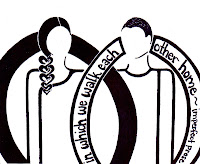The Martyrdom of Self-Knowledge
There is another kind of martyrdom. It is the martyrdom of facing oneself, one's emotional self. No one wants to face his emotional self. Nobody wants to admit that he or she acts at times like a 10 year old, that they have different moods, that they are afraid of the silliest things. We don't like to face these facts. This is the beginning of our martyrdom. The second stage of the journey toward martyrdom is being torn apart between your emotional states and knowing yourself as you are. The third stage is an ability to really face oneself without all the emotional camouflage. Though painful, it is a stage so filled with grace, that in a sense, it ceases to be a martrydom and becomes a sort of oneness with God.
Now one looks at one's sins truly and honestly. That looking is another phase of the martyrdom. But one is no longer upset or in any despair. The martyrdom is being oiled by the love of God. It no longer rubs abrasively, hurtfully. There descends an understanding that all martyrdom in this area of self-knowledge is one of the greatest graces that God can give us. The poustinia gives birth to that grace. Outside the poustinia it is more difficult to acquire it because too many things distract us---and because we desire to be distracted. Some people may think that such self-knowledge will lead to depression. For a Russian, depression in the poustinia is impossible. A person who tends towards a depressive complex will not choose the poustinia. He will choose a pilgrimage because he is restless, unhappy. He has to keep moving all the time.
The martyrdom continues. We are beginning to know who we are. We are beginning to be at home in our difficulties, with our sins, seeing with more clarity of soul. Clarity of soul is different from clarity of mind. I can see my sins clearly with my mind. I can use the methods recommended by ascetical theology (which is based on reason) to overcome my sins. But clarity of soul is acquired by the gift of tears. I weep, and the tears wash away my sins and the sins of others. My mind is serene and unaffected, because I know that the grace of tears is not from my mind but proceeds from the heart of God.
by Catherine Doherty, Poustinia: Encountering God in Silence, Solitude and Prayer
Now one looks at one's sins truly and honestly. That looking is another phase of the martyrdom. But one is no longer upset or in any despair. The martyrdom is being oiled by the love of God. It no longer rubs abrasively, hurtfully. There descends an understanding that all martyrdom in this area of self-knowledge is one of the greatest graces that God can give us. The poustinia gives birth to that grace. Outside the poustinia it is more difficult to acquire it because too many things distract us---and because we desire to be distracted. Some people may think that such self-knowledge will lead to depression. For a Russian, depression in the poustinia is impossible. A person who tends towards a depressive complex will not choose the poustinia. He will choose a pilgrimage because he is restless, unhappy. He has to keep moving all the time.
The martyrdom continues. We are beginning to know who we are. We are beginning to be at home in our difficulties, with our sins, seeing with more clarity of soul. Clarity of soul is different from clarity of mind. I can see my sins clearly with my mind. I can use the methods recommended by ascetical theology (which is based on reason) to overcome my sins. But clarity of soul is acquired by the gift of tears. I weep, and the tears wash away my sins and the sins of others. My mind is serene and unaffected, because I know that the grace of tears is not from my mind but proceeds from the heart of God.
by Catherine Doherty, Poustinia: Encountering God in Silence, Solitude and Prayer



Comments
Post a Comment